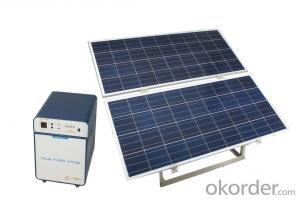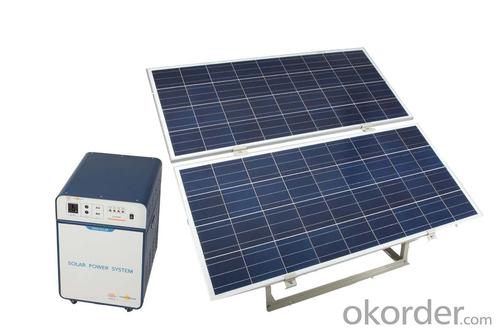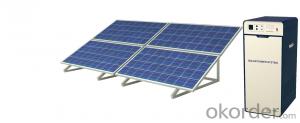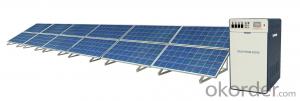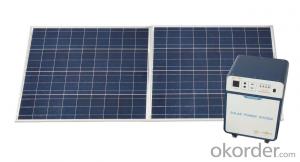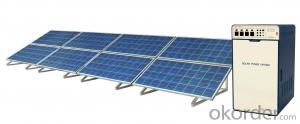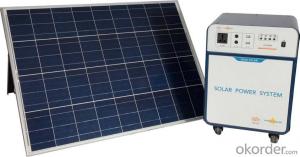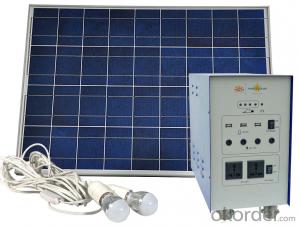Off-grid Solar Power System JS-SPS-600
- Loading Port:
- Tianjin
- Payment Terms:
- TT OR LC
- Min Order Qty:
- 10 set
- Supply Capability:
- 10000 set/month
OKorder Service Pledge
OKorder Financial Service
You Might Also Like
General Introduction
Solar power system provides alternating current and direct current, which is produced by the modules transforming solar power into power, to home lighting, household appliance and other DC appliance, such as cell phone and laptop.
Solar power system is widely used in area lack of power, for example house power supplying, monitoring, communication base, fire prevention in forest area, pasture and meadow, aquaculture etc.
We are dedicated to provide high quality off-grid PV products and systems to customers and has received a series of certificate, including ISO9001, TUV, UL, CE, CQC and RoHS.
Off-grid Solar Power System
High efficent PV module can produce more power.
Sine wave output is suitable for all kinds of load. Varieties of DC output, let it more
convenient for users.
The multifunction design make it easy to operation and maintenance.
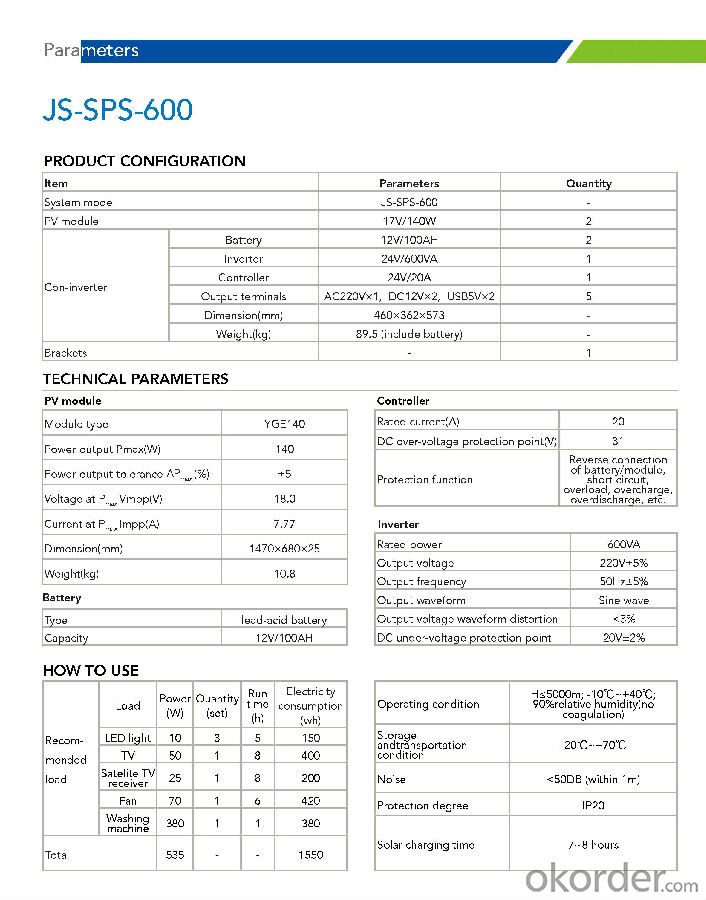
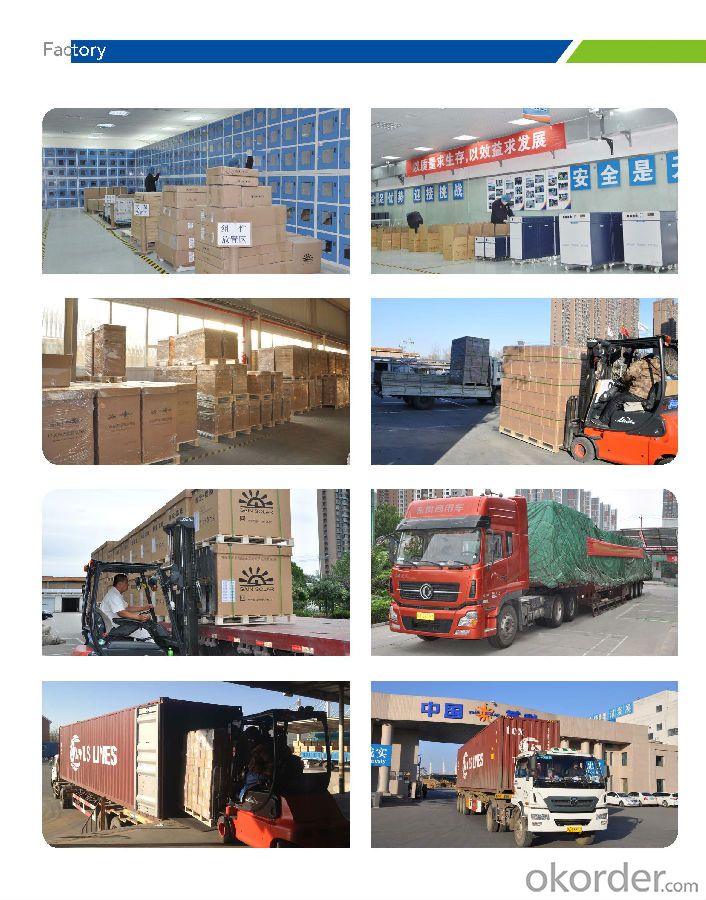
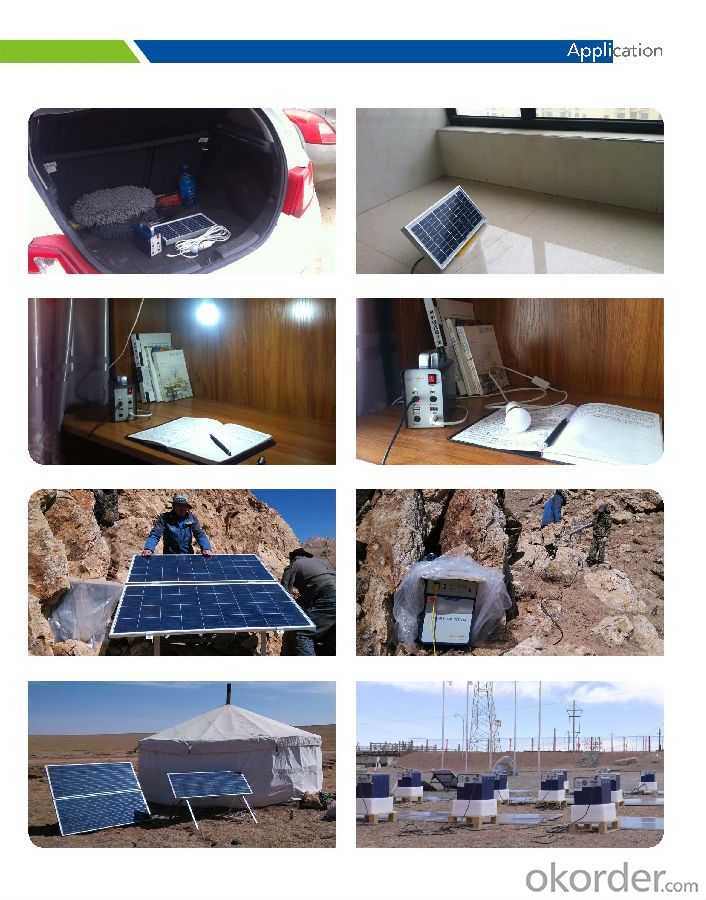
- Q: Are there any tax credits available for installing solar energy systems?
- Yes, there are tax credits available for installing solar energy systems. The federal government offers a solar Investment Tax Credit (ITC), which allows homeowners and businesses to deduct a percentage of the cost of their solar system from their taxes. Additionally, some states and local governments also provide their own incentives and tax credits for solar installations. It is recommended to consult with a tax professional or visit official government websites to determine the specific tax credits available in your area.
- Q: How does a solar energy system work?
- A solar energy system works by capturing sunlight using photovoltaic (PV) panels or solar thermal collectors. The PV panels convert sunlight directly into electricity by using semiconductor materials, while solar thermal collectors use sunlight to heat water or air for various purposes. The electricity generated by the PV panels can be used to power homes or businesses, or it can be stored in batteries for later use. Additionally, excess electricity can be fed back into the grid for credit or sold to utility companies. Overall, solar energy systems harness the power of the sun to provide clean and renewable energy.
- Q: How does the efficiency of solar panels vary across different installation tilts?
- The efficiency of solar panels can vary across different installation tilts due to several factors. The ideal tilt angle for solar panel installation depends on the geographical location and the intended purpose of the solar system. In general, solar panels produce the highest energy output when they are installed at an angle that maximizes the amount of sunlight they receive throughout the day. The optimal tilt angle for solar panels is typically equal to the latitude of the location, ensuring that the panels are perpendicular to the sun's rays during peak sunlight hours. However, the efficiency of solar panels can be affected by deviations from the optimal tilt angle. If the panels are installed at a steeper tilt angle, they may receive more direct sunlight during certain parts of the day, resulting in increased energy production. Conversely, if the panels are installed at a shallower tilt angle, they may receive more diffuse sunlight, which can reduce their efficiency. Furthermore, the efficiency of solar panels can also be influenced by the time of year. In many locations, the sun's position in the sky changes throughout the year, resulting in varying optimal tilt angles. Some solar systems are designed with adjustable mounting systems that allow for seasonal changes in tilt angle to maximize energy production. It is important to note that while the efficiency of solar panels can vary across different installation tilts, the overall energy output of a solar system is also influenced by other factors such as the quality of the panels, the cleanliness of the panels, and the presence of shading. Proper maintenance and regular monitoring of the system can help ensure optimal performance regardless of the installation tilt.
- Q: What is the impact of temperature on the performance of solar panels?
- The impact of temperature on the performance of solar panels is that higher temperatures can decrease the efficiency of the panels. As the temperature increases, the electrical conductivity of the semiconductors in the solar cells decreases, resulting in reduced power output. This phenomenon is known as the temperature coefficient of the solar panel. Therefore, it is important to consider the temperature when designing and installing solar panels to maximize their performance and overall energy production.
- Q: Can solar energy systems be used for electric vehicle charging?
- Yes, solar energy systems can be used for electric vehicle charging. Solar panels can generate electricity from the sun's energy, which can then be used to charge electric vehicles. This renewable energy source provides a sustainable and eco-friendly solution for powering electric vehicles.
- Q: Can solar energy systems be used for powering off-grid communities?
- Yes, solar energy systems can definitely be used for powering off-grid communities. They provide a reliable and sustainable source of electricity in remote areas where grid connection is not feasible or economically viable. Solar panels capture sunlight and convert it into electricity, which can be stored in batteries for use during nighttime or cloudy days. This makes solar energy an ideal solution for off-grid communities, as it reduces their dependence on fossil fuels and helps in achieving energy independence.
- Q: Can solar energy systems be used in areas with high levels of dust or sand?
- Solar energy systems can still function in dusty or sandy areas, although their efficiency may suffer. Dust or sand can gather on the surface of the panels, limiting the amount of sunlight that reaches the photovoltaic cells. Consequently, the system's energy production may decline. To address this issue, regular cleaning and maintenance of the solar panels are necessary in dusty or sandy regions. This can involve rinsing the panels with water or utilizing automated cleaning systems. Additionally, adjusting the tilt angles of the panels can minimize the accumulation of dust or sand. Moreover, advancements in solar panel technology have led to the creation of self-cleaning panels that repel dust or sand particles. These panels employ hydrophobic coatings or anti-soiling technologies to prevent dust buildup and maintain optimal energy production. In conclusion, although solar energy systems can operate in areas with high levels of dust or sand, it is crucial to implement appropriate maintenance and cleaning practices to ensure maximum efficiency and energy production.
- Q: Can a solar energy system be used in areas with limited sunlight?
- Yes, a solar energy system can still be used in areas with limited sunlight. While it is true that solar panels produce the most electricity when exposed to direct sunlight, they can still generate power even in areas with limited sunlight. Solar panels can still produce electricity on cloudy days or during periods of low sunlight, albeit at a reduced efficiency. Additionally, advancements in solar panel technology have made it possible for panels to capture and convert even diffuse sunlight, which means they can still function in areas with limited direct sunlight. Moreover, solar energy systems can be designed to include energy storage solutions such as batteries, allowing for the storage of excess energy generated during periods of peak sunlight for use during periods of limited sunlight. This ensures that solar energy can still be utilized in areas with limited sunlight, making it a viable and sustainable energy solution for various regions around the world.
- Q: How do solar energy systems contribute to reducing reliance on fossil fuels?
- Solar energy systems contribute to reducing reliance on fossil fuels by harnessing the power of the sun to generate electricity. Unlike fossil fuels, solar energy is a renewable resource that does not deplete over time. By utilizing solar panels to capture sunlight and convert it into usable energy, we can reduce the need for burning fossil fuels, which are not only finite but also contribute to air pollution and climate change. Switching to solar energy systems helps to decrease carbon emissions, mitigate the harmful effects of fossil fuel extraction and combustion, and promote a sustainable and cleaner energy future.
- Q: Can solar energy systems be used for powering electric boat charging stations?
- Yes, solar energy systems can be used for powering electric boat charging stations. Solar panels can be installed on the charging station's roof or nearby to harness sunlight and convert it into electricity. This renewable energy source can then be used to charge electric boats, making the charging process eco-friendly and sustainable.
Send your message to us
Off-grid Solar Power System JS-SPS-600
- Loading Port:
- Tianjin
- Payment Terms:
- TT OR LC
- Min Order Qty:
- 10 set
- Supply Capability:
- 10000 set/month
OKorder Service Pledge
OKorder Financial Service
Similar products
Hot products
Hot Searches
Related keywords
